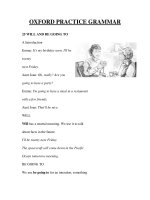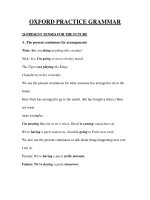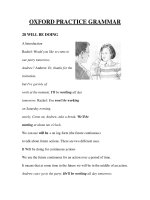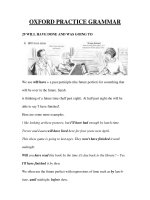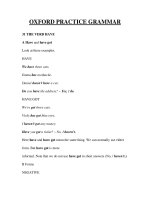Tài liệu OXFORD PRACTICE GRAMMAR 32 doc
Bạn đang xem bản rút gọn của tài liệu. Xem và tải ngay bản đầy đủ của tài liệu tại đây (288.92 KB, 5 trang )
OXFORD PRACTICE GRAMMAR
32 SHORT FORMS, E.G. IT'S, DON'T
A The use of short forms
A short form like it's or don't stands for the full form it is
or do not. We leave out one or more letters and we write
an apostrophe (') instead. We use short forms in
conversational English and in informal writing such as a
letter to a friend. Short forms are sometimes called
'contracted forms'.
We cannot use a short form when the word is stressed, in
a short answer for example.
Have you looked in this drawer? ~ Yes, I have, NOT Yes, I've
But we can use n't in a short answer: No, I haven't.
B The most common short forms
Some verbs can have short forms when they come after I, you, etc.
VERB SHORT FORMS
am I'm
are you're, we're, they're
is/has he's, she's, it's
have I've, you've, we've, they've
had/would I'd, you'd, he'd, she'd, it'd, we'd, they'd
will I'll, you'll, he'll, she'll, it'll, we'll, they'll
shall I'll, we'll
A short form can also come after a noun.
Vicky's lost her bank card. (Vicky has ...) The card'll be in here. (The card
will...)
There are also some short forms with question words and with here, there
or that.
who's, what's, where's, when's, how's, who'd, who'll, what'll
here's, there's, that's, there'll, that'll, there'd, that'd
There is a negative short form n't which can come after some verbs.
aren't, isn't, wasn't, weren't, haven't, hasn't, hadn't, don't /daunt/, doesn't,
didn't, won't (- will not), shan't
(= shall not), can't , couldn't, mustn't , needn't, mightn't, shouldn't, wouldn't,
daren't
Sometimes we can shorten either not or the verb.
It is not funny. - * It isn't funny. OR It's not funny.
You will not believe it. -> You won't believe it. OR You'll not believe it. But
we cannot use n't after I.
I am not sure. -> I'm not sure, NOT I amn't sure.
C 's and 'd
's can be is or has, and 'd can be had or would.
She's short, and she's got fair hair. (She is short... she has got...) If
I'd known, I'd have told you. (If I had known, 1 would have ...)
32 EXERCISES
1 Short forms (B)
Write the sentences in a more informal style, with short forms.
In a business letter In a letter to a friend
► You are quite right. You're quite right.
1 It is a difficult problem.
2 I have seen the results.
3 I do not have any information.
4 We have not reached a decision.
5 I am very excited about it.
6 You need not decide now.
7 It is not yet certain.
8 We will be pleased to see you.
9 Do not worry.
10 I would like to buy a new computer.
11 We are willing to help.
12 We will not know the result for some time.
2 Short forms (B)
Complete the dialogues. Put in the short form of these phrases: do
not, he is, I am, is not, it is, what is, where is
► How are you? ~ I'm fine, thanks.
1 .............. your luggage? ~ ............................... in Los Angeles.
2 Do you like this shirt? ~ No, I ................................................
It............................................ my style.
3……………………..that smell? ~ My
husband……………………………… doing a chemical
experiment.
3 's and 'd
Write the forms in full. Use is, has, had or would.
► What's your name? What is your name ?
1 I'd like a coffee, please.
2 There's been an accident.
3 That's correct.
4 I'd seen the film before.
5 Who's got the key?
h We'd have stopped if we'd seen you.



